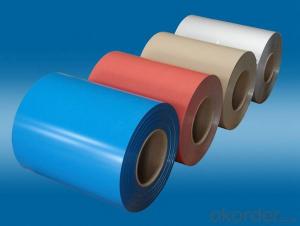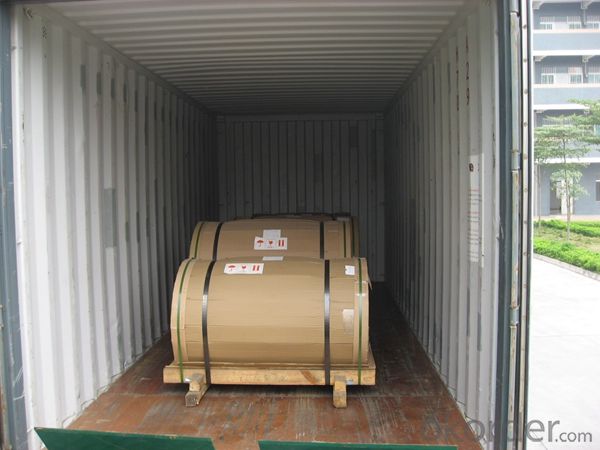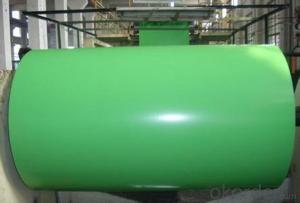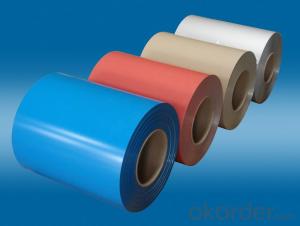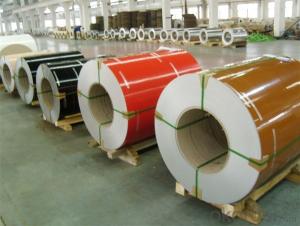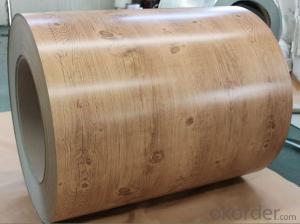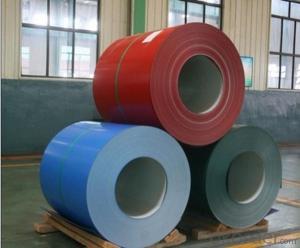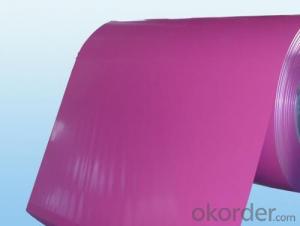Paint Aluminum Coil for Wall System
- Loading Port:
- Shanghai
- Payment Terms:
- TT OR LC
- Min Order Qty:
- 5 m.t.
- Supply Capability:
- 10000 m.t./month
OKorder Service Pledge
OKorder Financial Service
You Might Also Like
Specification
1. Specification of Color Coated Aluminum Coil for Wall System
characteristics | Application |
1) Super peeling strength | 1) Building exterior curtain walls |
2) Excellent surface flatness and smoothness | 2) Decoration and renovation additions for old buildings |
3) Superior weather, corrosion, pollutant resistance | 3) Decoration of interior walls, ceilings, bathrooms, kitchens and balconies |
4) Even coating, various colors | 4) Shop door decorations |
5) Fireproof, excellent heat and sound insulation | 5) Advertisement board display platforms and signboards |
6) Superior impact resistance | 6) Wallboards and ceilings for tunnels |
7) Lightweight and easy to process | 7) Industrial materials, materials for vehicles and boats |
2. Application of Color Coated Aluminum Coil for Wall System
(1).Interior: wall cladding, ceilings, bathrooms, kitchens and balconies, shutters, doors...
(2).Exterior: wall cladding, facades, roofing, canopies, tunnels,column covers , renovations...
(3).Advertisement: display platforms, signboards, fascia, shop fronts...
3. Feature of Color Coated Aluminum Coil for Wall System
*Such coil is specially designed to replace aluminum ingot, due to the high export tax of aluminum ingot, the coil has better price than ingot.
*This type of coil can fit customer's remelting furnace just like ingot, no need to make any change to the production line that was previously used for ingot. The standard coil size and weight is very suitable for the feed gate of furnace.
*This type of coil causes less material wastage than ingot when remelted.
*Our coil is made directly from ore, no need to go though the ingot making process, quality is much better than other suppliers who use ingot scrap to make coil.
Be free from Oil Stain, Dent, Inclusion, Scratches, Stain, Oxide Dicoloration, Breaks, Corrosion, Roll Marks, Dirt Streaks and other defect which will interfere with use
4. Certificate:
SGS and ROHS(if client request, paid by client), MTC(plant provided), Certificate of Origin(FORM A, FORM E, CO), Bureau Veritas and SGS (if client request, paid by client), CIQS certificate
5. Image of Color Coated Aluminum Coil for Wall System
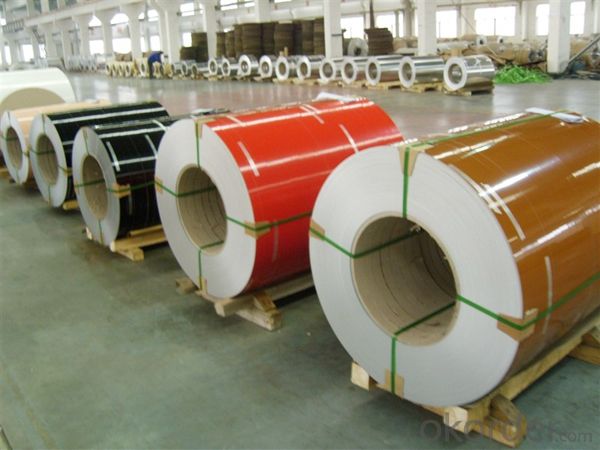
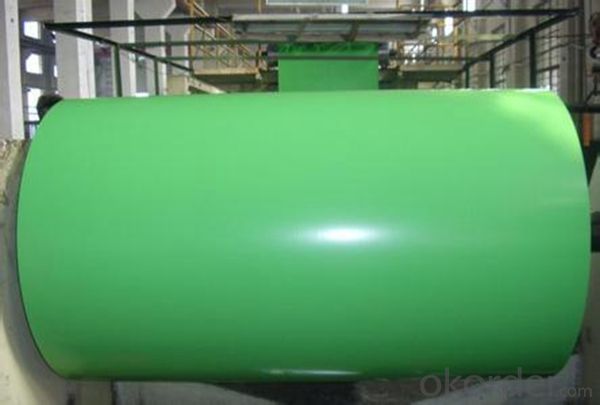
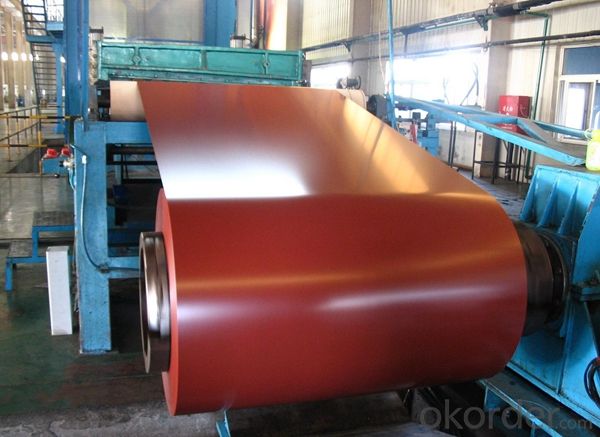
6. Package and shipping of Color Coated Aluminum Coil for Wall System
eye to wall
eye to the wall
with wood pallet (wooded case also available)
7. FAQ
1) What is the delivery time?
Dpends on actual order, around 20 to 35 days
2)What is the QC system:
We have QC staff of 20 persons and advanced equipment, each production is with MTC traced from Aluminum ingot lot.
3) What market do you mainly sell to?
Australia, America, Asia, Middle East, Western Europe, Africa etc
- Q: How are aluminum coils used in the production of automotive radiators?
- Aluminum coils are commonly used in the production of automotive radiators due to their excellent heat transfer properties and lightweight nature. The coils are typically made from high-quality aluminum alloy, which offers superior thermal conductivity compared to other materials. In the manufacturing process, aluminum coils are first shaped into the desired configuration for the radiator's core. This can be done through various methods, such as extrusion or rolling. The coils are then carefully stacked and bonded together to create a sturdy and efficient heat exchanger. The main role of aluminum coils in automotive radiators is to transfer heat from the engine coolant to the surrounding air. As hot coolant flows through the tubes of the radiator, the aluminum coils efficiently absorb this heat. The large surface area of the coils, combined with their excellent thermal conductivity, allows for effective heat dissipation. Moreover, the lightweight nature of aluminum makes it an ideal material for automotive radiators. Reduced weight in vehicles leads to improved fuel efficiency and overall performance. Aluminum coils contribute to this by providing a radiator that is lighter than traditional copper or brass counterparts. Furthermore, aluminum coils offer other advantages in radiator production. They are corrosion-resistant, which helps prolong the lifespan of the radiator and ensures its durability. Aluminum coils also enable more flexible designs, allowing for the creation of radiators with complex shapes and configurations to fit various vehicle models. In conclusion, aluminum coils play a crucial role in the production of automotive radiators. Their excellent heat transfer properties, lightweight nature, corrosion resistance, and design flexibility make them an ideal choice for manufacturing efficient and reliable radiators for automobiles.
- Q: Can aluminum coils be painted or coated with different colors?
- Yes, aluminum coils can be painted or coated with different colors.
- Q: How are aluminum coils cleaned and maintained?
- Regular cleaning is essential for maintaining the optimal performance and efficiency of aluminum coils, which are commonly used in HVAC systems and refrigeration units. Here's a step-by-step guide on how to clean and maintain them: 1. Prioritize safety: Before starting the cleaning process, ensure that the power to the HVAC system or refrigeration unit is switched off to prevent accidents. 2. Remove debris: Begin by getting rid of any visible debris like leaves, dirt, or dust from the aluminum coils. Use a soft brush or a vacuum cleaner with a brush attachment to gently eliminate the debris. 3. Apply a cleaning solution: Create a cleaning solution by mixing water with a mild detergent or coil cleaner. Follow the instructions on the product label to achieve the proper dilution ratio. Transfer the solution to a spray bottle. 4. Use the cleaning solution: Spray the cleaning solution onto the aluminum coils, ensuring that all areas are covered. Allow the solution to sit for a few minutes to loosen any dirt or grime. 5. Gently scrub the coils: Use a soft brush or a coil cleaning brush to gently scrub the aluminum coils. Take care not to apply excessive pressure, as it may damage the delicate fins on the coils. Concentrate on areas with stubborn dirt or buildup. 6. Rinse with water: After scrubbing, thoroughly rinse the aluminum coils with clean water. You can use a hose or a pressure washer on a low setting to ensure that all the cleaning solution and dirt are removed. Make sure that the water flows in the opposite direction of the airflow to prevent pushing debris further into the coils. 7. Inspect for damage: While cleaning, inspect the aluminum coils for any signs of damage, such as bent fins or leaks. If you notice any issues, it is advisable to contact a professional technician for repairs. 8. Allow for complete drying: Once rinsed, allow the aluminum coils to air dry completely before turning the power back on. This will prevent any moisture-related problems and ensure that the coils are ready for use. 9. Maintain a regular cleaning schedule: To keep the aluminum coils in excellent condition, it is crucial to establish a regular cleaning schedule. Generally, cleaning every three to six months is recommended, depending on usage and environmental factors. However, if the coils are located in a highly polluted or dusty area, more frequent cleaning may be necessary. By following these steps and adhering to a regular cleaning schedule, you can ensure that your aluminum coils remain clean, efficient, and in optimal working condition.
- Q: What are the thermal conductivity properties of aluminum coils?
- The properties of aluminum coils include excellent thermal conductivity. Aluminum is recognized for its high thermal conductivity, which allows it to efficiently transfer heat. As a result, aluminum coils are well-suited for applications that necessitate effective heat transfer, such as air conditioning and refrigeration systems. The thermal conductivity of aluminum coils enables rapid and efficient cooling or heating, leading to enhanced performance and energy efficiency. Furthermore, aluminum's favorable thermal conductivity guarantees the even distribution of heat across the coil, preventing localized areas of high temperature and ensuring uniform temperature distribution. In conclusion, the thermal conductivity properties of aluminum coils make them a preferred option for a wide range of heat transfer applications.
- Q: What are the different ACP (Aluminum Composite Panel) applications for aluminum coils?
- Some of the different applications for aluminum coils in Aluminum Composite Panels (ACP) include building facades, signage, interior decoration, cladding, and insulation. The versatility and durability of ACP make it suitable for a wide range of architectural and construction projects.
- Q: Is it safe for individuals to handle aluminum coils?
- <p>Aluminum coils are generally safe to handle under normal conditions. They do not emit harmful radiation or toxic fumes. However, it's important to take precautions to avoid injury from sharp edges or heavy weight. Always use appropriate lifting equipment or assistance when handling heavy coils. Additionally, wear protective gloves to prevent cuts and ensure good housekeeping to avoid tripping hazards. In case of skin contact with certain aluminum processing fluids, it's advisable to wash the affected area immediately with soap and water.</p>
- Q: Can aluminum coils be used in the production of lighting fixtures?
- Indeed, the utilization of aluminum coils is viable in the manufacturing process of lighting fixtures. Being both lightweight and durable, aluminum qualifies as an exceptional metal that effectively resists corrosion, rendering it an ideal preference for the production of lighting fixtures. With the ability to be effortlessly manipulated and molded into diverse configurations and dimensions, aluminum coils can readily accommodate the precise requisites of lighting fixtures. Moreover, aluminum boasts remarkable thermal conductivity, facilitating efficient dissipation of heat within lighting fixtures, guaranteeing optimum performance and durability. In summary, aluminum coils furnish a cost-efficient and adaptable resolution for the production of lighting fixtures.
- Q: How do aluminum coils contribute to energy efficiency in buildings?
- Aluminum coils contribute to energy efficiency in buildings by improving the heating and cooling systems. These coils are commonly used in HVAC systems, where they help in transferring heat effectively. The high thermal conductivity of aluminum allows for faster heat transfer, resulting in more efficient cooling and heating processes. Additionally, aluminum coils are lightweight and corrosion-resistant, reducing the load on the HVAC system and ensuring its longevity. Overall, the use of aluminum coils in buildings helps to conserve energy and reduce utility costs.
- Q: How do aluminum coils contribute to noise reduction in buildings?
- The unique properties and installation techniques of aluminum coils can contribute to noise reduction in buildings. To begin, aluminum's density and ability to absorb and dampen sound waves make it a highly efficient sound insulator. When used as coil insulation, aluminum effectively blocks and reduces airborne noise transmission, minimizing the impact of external sounds on the building's interior. In addition to aluminum's inherent sound insulation properties, the installation of aluminum coils in buildings can further enhance noise reduction. By strategically placing the coils in areas where noise transmission is likely to occur, such as HVAC systems and ductwork, potential gaps or openings that could allow sound to travel are eliminated when tightly sealed with aluminum coils. Furthermore, aluminum coils act as a barrier to vibration and resonance noises. They can be installed around mechanical equipment or structural elements prone to vibration, effectively dampening these vibrations and preventing them from propagating throughout the building. This is particularly important in reducing low-frequency noises, which are typically more difficult to control and can significantly impact the comfort and productivity of occupants. Moreover, aluminum coils offer durability and longevity, ensuring their effectiveness in noise reduction over a long period. They are resistant to corrosion, moisture, and other environmental factors, maintaining their sound-insulating properties and preventing sound leakage. In conclusion, by combining the sound insulation properties of aluminum with strategic installation techniques, such as sealing gaps and dampening vibrations, aluminum coils play a vital role in reducing noise transmission in buildings. Their ability to absorb, block, and dampen sound waves makes them an effective solution for creating quieter and more comfortable indoor environments.
- Q: What is the typical modulus of elasticity for aluminum coils?
- Aluminum coils typically have a modulus of elasticity of approximately 70 GPa (gigapascals) or 10 million psi (pounds per square inch). The modulus of elasticity gauges a material's inflexibility or capacity to withstand distortion under an external force. Aluminum is renowned for its impressive strength-to-weight proportion and remarkable elasticity, rendering it a favored option across diverse sectors such as automotive, aerospace, and construction. Nonetheless, it is noteworthy to acknowledge that the modulus of elasticity may slightly differ depending on the particular alloy and temper of the aluminum coil.
Send your message to us
Paint Aluminum Coil for Wall System
- Loading Port:
- Shanghai
- Payment Terms:
- TT OR LC
- Min Order Qty:
- 5 m.t.
- Supply Capability:
- 10000 m.t./month
OKorder Service Pledge
OKorder Financial Service
Similar products
Hot products
Hot Searches
Related keywords
